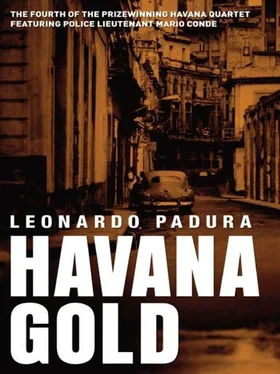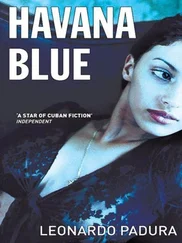The car drove off down the black slope of Red Square towards the grimy 10 October Highway.
“Call your lady-love and tell her you’ll see her at nine. Caridad will be a quicky,” suggested Conde attempting to relieve his colleague’s frustrations.
“I don’t have any option, do I? Why don’t we go to see that Dagmar woman?”
Conde looked at the notebook where Manolo had jotted down the teacher’s address.
“I’d rather not do anything until we’ve spoken to the girl’s mother. Why don’t you ring Dagmar and see her tomorrow? I need you to look into something else. Go to headquarters and have a word with the Drugs people. Try to speak to Captain Cicerón. I need them to tell me all they know about marijuana in this area and to analyse what turned up in Lissette’s lavatory. There are several very strange things about this case and I’m most interested in the remnants of marijuana in the lavatory. It was really real amateurish to leave something behind like that.”
Manolo waited for the lights to change on Acosta and then said: “They didn’t steal anything either.”
“Yes, if only a couple of things had gone missing, we could think that was the motive.”
“Hey, Conde, are we really going to finish early?”
The lieutenant smiled.
“You’re worse than a bedbug with insomnia.”
“Conde, your problem is you’ve never seen Adriana.”
“Fuck, Manolo, if it’s not Adriana, it’s her sister, you’re always at it.”
“No, my friend, this time, it’s special. Just imagine if I’m thinking of getting married. You don’t believe me? I swear by my mother…”
The Count smiled because he couldn’t for the life of him recall how often Manolo had made the same pledge. It was astonishing that his mother was still among the living after he’d invoked her so often. He looked out at the Highway, packed with people desperately trying to catch a bus to return home to lives that rarely managed to be normal. After so many years working in the police he’d got used to seeing people as potential suspects whose wretched existences he’d have to scavenge, like a carrion crow, only to uncover tons of heaving hatred, fear, envy and frustration. None of the people he got to know on any investigation was ever happy, and that absence of happiness, now also impacting on his own life, seemed a sentence that was too long and wearisome for him to bear, and the idea of leaving his job began to shape into a firm decision. After all, he thought, what a joke: me putting order into other people’s lives, how about setting my own right?
“Do you really like being a policeman, Manolo?” he asked, almost without thinking.
“I think I do, Conde. Besides, it’s all I know.”
“But if you like it, you must be mad. Like me.”
“I like a bit of madness,” Manolo confessed crossing the railway line without slowing down. “Just like that headmaster.”
“What did you make of that guy?”
“I don’t know, Conde, I don’t think I like him, but don’t take any notice of me. It’s only an impression.”
“As impressions go, mine’s no different.”
“Hey, Conde, I’ll tell Adriana eight-thirty, right?”
“That’s what I said, Manolo. Hey, you’re a man who says he’s had lots of women, did one ever play the saxophone?”
Manolo slowed down imperceptibly, looked at his boss and smiled: “With her mouth?”
“Go screw yourself!” yelped the Count, also smiling. There’s no respect these days, he told himself, as he lit a cigarette a couple of blocks from home. He felt better now: he’d be free for almost three hours and would sit down and write. Write whatever. Just write.
I insisted on the Beatles. It may be your cassette recorder and you can kick up a fuss, but I want to hear the bloody Beatles, Strawberry Fields is the best song in the history of the world, I defended my tastes, adamantly, and why the fuck did you ring? He said, Dulcita. He was so skinny at times it seemed he wouldn’t be able to speak and his Adam’s apple moved, as if he were swallowing. OK, and what else? Dulcita’s off. She’s off, he said and suddenly I couldn’t decide where the hell she was off to: home, school, the moon, to the Donkey’s Back, when I realized I was the only donkey there; off means you’re leaving; skedaddling, making a quick, swift exit, going off, with one possible destination: Miami. Going off means not coming back. But why? She rang me last night to tell me. I’ve practically not seen her since I had that row with her. She sometimes rings me, or I ring her – we’re still good mates in spite of the way I shat on her with Marián – to tell me: I’m off.
The evening light shone through the window and painted the room golden. Strawberry Fields was now a sad song and we looked at each other without saying a word. What was there to say? Dulcita was the best in our gang, the defender of the meek and needy, we’d say to rile her, the only one who listened to everybody else and the one we all loved because she knew what love was: she was one of us, and suddenly she was off. Maybe we’d never see her again to be able to say, Fuck, how beautiful Dulcita is, never be able to write to her, talk to her or even remember her, because she’s off and anyone who’s off is sentenced to lose everything, even the space they occupy in the memories of friends. But why? I don’t know, he said, I didn’t ask: that’s beside the point, the point is that she is going, he said and stood up in front of the window and the bright light made it impossible for me to see his face as he said, Shit, shit, shit, she’s leaving, and I realized he might cry on cue and would be right to, because even our memories would be incomplete, and he said: I’ll see her tonight. Me too, I told him. But we never did: Dulcita’s mother told us, She’s ill, she’s asleep, but we knew she wasn’t asleep or ill. The fact is she’s off, I thought, and it was a long time before I understood why: Dulcita, the perfect, the best, the woman who so often showed she was a man, a man ready for anything. We walked back, silent and sorrowful, and after we’d crossed the Highway I remember Skinny had said: Look, what a beautiful moon.
Conde had always thought he liked that barrio: the Casino Deportivo had been built in the fifties for a bourgeoisie that couldn’t afford mansions with swimming pools, but was ready to pay for the luxury of a bedroom for each child, a nice entrance and a garage for the car they would surely have. The passage of time and the dispersal of most of the original inhabitants hadn’t overly changed the area’s appearance. Because it’s a development and not a barrio, the Count corrected himself, as the car proceeded along Seventh Avenue while he looked for the intersection with Acosta, noting how quietly darkness fell there, without abrupt changes or strong winds, as if the contingencies and disruptions visited on the city were banned in that pasteurized reserve almost wholly inhabited by the new leaders of the new epoch. Houses were still painted and gardens tidy while Ladas, Moskovichs and newly acquired Polish Fiats, with their protectively tinted glass, filled the car porches. Few people walked the streets, and those who did walked with the peace of mind that absence of danger brings: there are no thieves, and the young women are all beautiful, almost vestal, like their houses and gardens; nobody owns mongrels and the drains don’t spew shit and other offensive waste. It was here that Conde had been to some of the best parties of his time at Pre-Uni: there was always a combo, the Gnomes, the Kents, the Highlights and they always danced rock and roll, never ballroom or anything Latin, and the parties didn’t end in bottle fights, as in his down-st-hell, trouble-making barrio. Yes, this was a place to live the good life, he told himself, when he saw the two-storey house – which was also beautiful, freshly painted with a well-trimmed little garden – where Caridad Delgado lived.
Читать дальше











